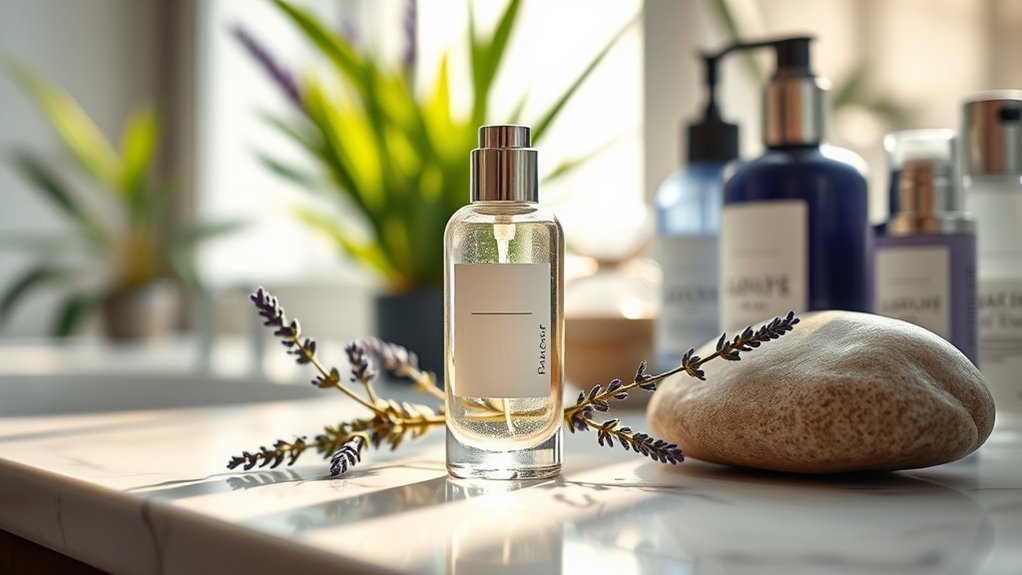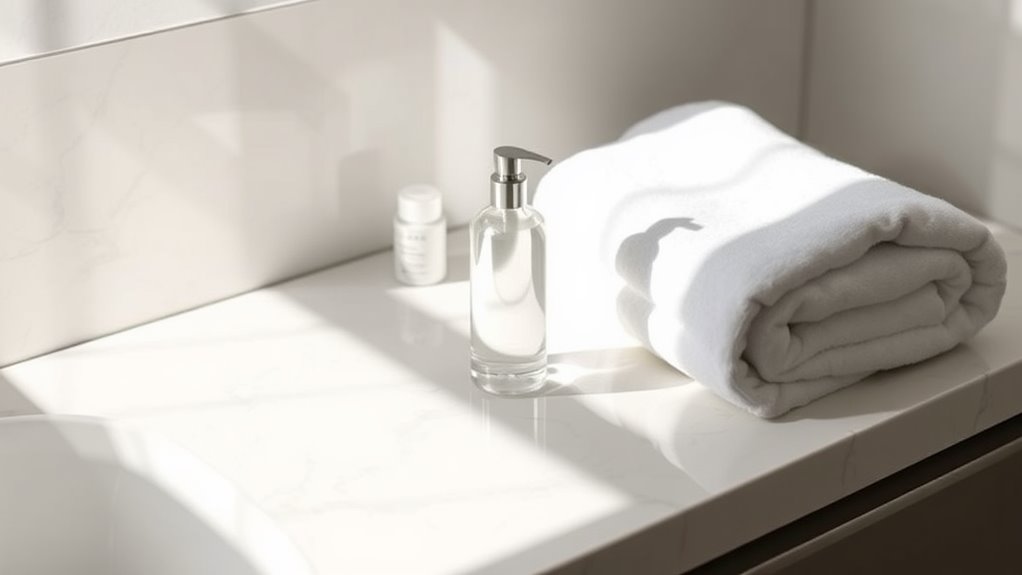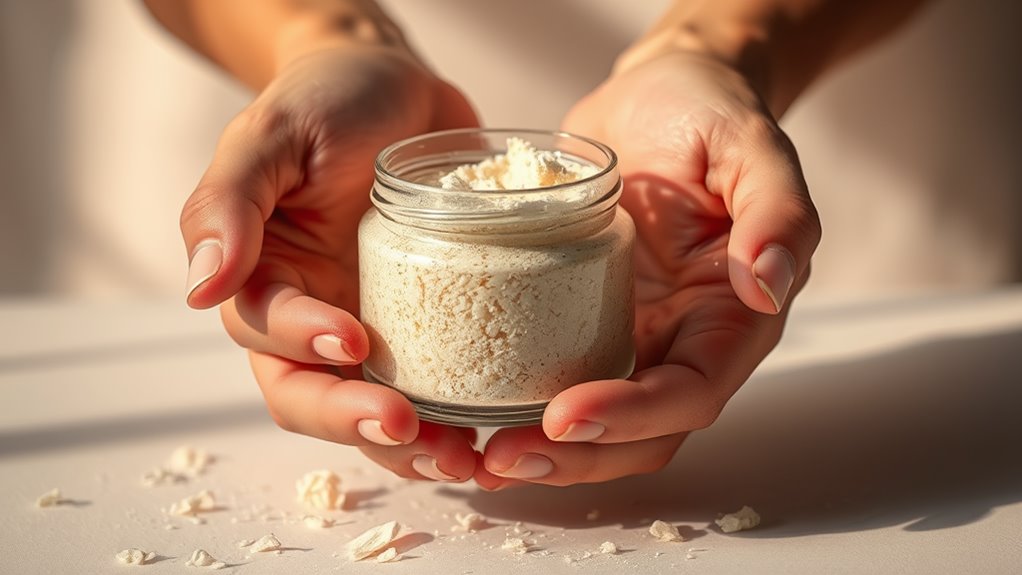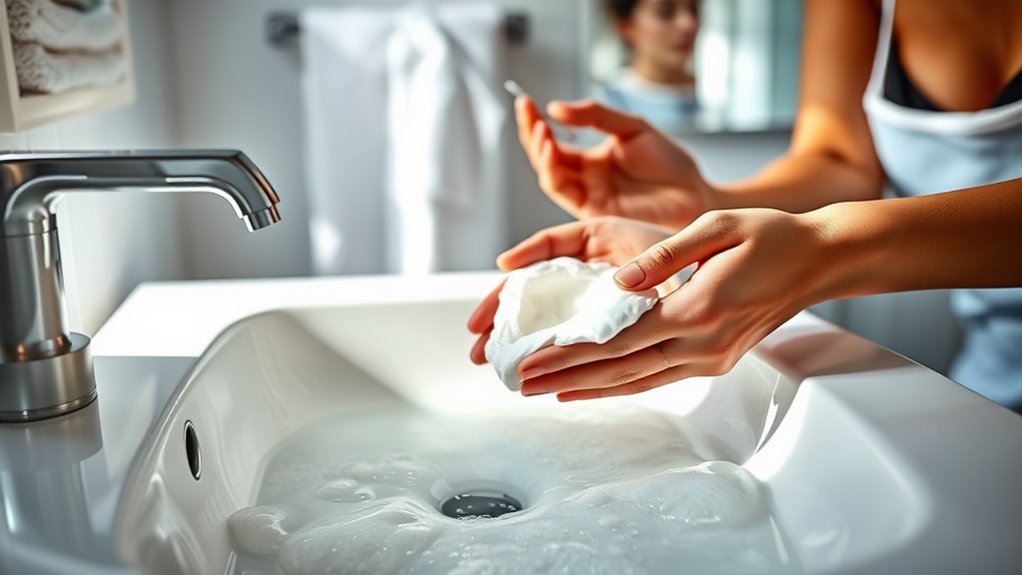The Best Cleanser for Your Skin Type – Finally Explained
Choosing the right cleanser for your skin type can make all the difference. For oily skin, look for salicylic acid or benzoyl peroxide. If you have dry skin, opt for creamy cleansers with hyaluronic acid or glycerin. Combination skin benefits from gel-based cleansers for oily areas and creamy ones for dry spots. Meanwhile, sensitive skin requires fragrance-free, hypoallergenic formulas. Want to know more about finding the perfect cleanser? Let’s explore the best options for each skin type.
Key Takeaways
- Identify your skin type: oily, dry, combination, or sensitive, to choose the right cleanser effectively.
- Use gel cleansers with salicylic acid for oily skin, and cream cleansers with hydrating ingredients for dry skin.
- Combination skin benefits from gel-based cleansers for oily areas and creamy formulas for dry patches.
- Select fragrance-free, hypoallergenic, non-foaming cleansers for sensitive skin to avoid irritation.
- Always test new products on a small area first to ensure they suit your skin without causing adverse reactions.
Understanding Your Skin Type
Understanding your skin type is the cornerstone of effective skincare. When you know whether your skin is oily, dry, combination, or sensitive, you can choose the right cleanser by skin type that’ll enhance your regimen.
Each skin type has unique characteristics; oily skin produces excess sebum, while dry skin lacks moisture. Combination skin exhibits both oiliness and dryness, and sensitive skin often reacts to products.
By identifying your skin type, you can select cleansers formulated with appropriate ingredients. For oily skin, look for foaming or gel-based cleansers that remove excess oil; for dry skin, cream-based cleansers can hydrate. Additionally, understanding specific skin types is crucial for selecting the best ingredients for your skincare routine.
Tailoring your cleanser choice to your specific skin type is essential for achieving that radiant, healthy complexion you desire.
Best Cleansers for Oily Skin
If you have oily skin, choosing the right cleanser can make all the difference in achieving a balanced complexion.
Look for key ingredients like salicylic acid, tea tree oil, and clay that effectively control excess oil and breakouts. Incorporating simple solutions for oily skin into your routine can enhance the results you achieve with your cleanser.
We’ll explore some top product recommendations and the best application techniques to maximize their effectiveness.
Key Ingredients to Look For
When searching for the best cleansers for oily skin, it’s essential to focus on key ingredients that can effectively balance oil production and prevent breakouts.
Look for salicylic acid, a beta hydroxy acid that penetrates pores, helping to unclog them and reduce inflammation. Benzoyl peroxide is another powerful option, targeting acne-causing bacteria while controlling excess oil.
Additionally, clay extracts, like bentonite or kaolin, absorb impurities and provide a refreshing feel. Niacinamide can help regulate sebum production and improve skin texture, making it an excellent choice for oily skin.
Lastly, gentle exfoliants, such as glycolic acid, can promote cell turnover without overly drying your skin.
Recommended Product Examples
Finding the right cleanser can make a significant difference in managing oily skin. Choosing a product that effectively balances oil production while preventing breakouts is crucial.
Here are three top recommendations:
-
La Roche-Posay Effaclar Purifying Foaming Gel
This gentle gel cleanser contains salicylic acid, targeting excess oil without stripping your skin’s moisture. -
Neutrogena Oil-Free Acne Wash
Formulated with benzoyl peroxide, this cleanser helps combat acne while keeping oiliness at bay. -
CeraVe Foaming Facial Cleanser
Enriched with ceramides, this option effectively cleanses while maintaining the skin barrier, making it ideal for oily skin types.
Application Techniques for Effectiveness
How can you maximize the effectiveness of your cleanser for oily skin? Start by using lukewarm water to dampen your face; this opens pores and prepares your skin for cleansing.
Apply a dime-sized amount of your chosen cleanser to your fingertips, then gently massage it into your skin using circular motions for about 30 seconds. Focus on areas prone to excess oil, like your forehead, nose, and chin.
Rinse thoroughly with cool water to close the pores and remove any residue. Follow up with a lightweight, oil-free moisturizer to maintain balance.
Best Cleansers for Dry Skin
If you have dry skin, choosing the right cleanser is crucial for maintaining hydration.
Look for products with hydrating ingredients like hyaluronic acid or glycerin, and consider whether a cream or gel formula suits your skin best. Understanding these differences can help you achieve a softer, more moisturized complexion. Additionally, be mindful of common mistakes that can worsen tight, dry skin and adjust your routine accordingly.
Hydrating Ingredients to Look For
When searching for the best cleansers for dry skin, you’ll want to focus on hydrating ingredients that nourish and replenish moisture.
These key components can transform your cleansing routine and benefit your skin’s overall health. Here are three hydrating ingredients to look for:
-
Hyaluronic Acid: This humectant draws moisture into the skin, helping to maintain hydration throughout the day.
-
Glycerin: An effective moisturizer, glycerin attracts water and locks it in, leaving your skin feeling soft and supple.
-
Aloe Vera: Known for its soothing properties, aloe vera hydrates while calming irritation, making it perfect for sensitive skin types.
Incorporating cleansers with these ingredients will help your dry skin feel refreshed and revitalized.
Cream vs. Gel Cleansers
Choosing the right type of cleanser can significantly impact how well your skin retains moisture, especially if you have dry skin.
Cream cleansers are typically richer and more hydrating, making them ideal for your skin type. They effectively dissolve makeup and impurities while providing essential moisture, leaving your skin feeling soft and supple.
On the other hand, gel cleansers tend to be lighter and can sometimes strip natural oils, which may exacerbate dryness. If you prefer a refreshing feel, opt for gel formulas with hydrating agents, but always follow up with a moisturizer.
Ultimately, the choice between cream and gel cleansers comes down to your personal preference and how your skin reacts. Prioritize hydration for optimal skin health.
Best Cleansers for Combination Skin
Finding the right cleanser for combination skin can feel like a daunting task, right?
You need a product that balances the oiliness of your T-zone while hydrating drier areas. Here are three top cleansers that cater specifically to your unique needs:
-
Gel-Based Cleanser: Look for one with salicylic acid to control oil without stripping moisture.
-
Creamy Cleanser: A hydrating formula with gentle ingredients like aloe can help soothe drier patches.
-
Micellar Water: This versatile option effectively removes makeup and dirt while being lightweight enough for all skin areas. Incorporating effective treatments can lead to a more balanced complexion and enhance your overall skincare routine.
Best Cleansers for Sensitive Skin
Sensitive skin requires a careful approach to cleansing, as harsh ingredients can easily cause irritation or redness. When selecting a cleanser, look for fragrance-free, hypoallergenic formulas that contain soothing agents like aloe vera or chamomile.
Creamy, non-foaming cleansers are often ideal, as they hydrate while gently removing impurities. Avoid sulfates and alcohol, which can strip your skin’s natural barrier. Instead, consider cleansers with ceramides or glycerin to maintain moisture.
Brands like Cetaphil, Vanicream, and La Roche-Posay offer effective options tailored for sensitive skin. Always patch test new products to ensure compatibility, and remember to cleanse gently—your skin deserves a nurturing hand, not a harsh scrub. Additionally, pay attention to sensitive skin symptoms as this helps in recognizing how your skin reacts to different products.
Prioritizing these factors will help you achieve a calm, balanced complexion.
Tips for Using Cleanser Effectively
How can you make the most of your cleansing routine? To elevate your skincare game, follow these essential tips for effective cleansing:
-
Choose the Right Cleanser: Match your cleanser to your skin type—gel for oily, cream for dry, and micellar water for sensitive skin.
-
Use Lukewarm Water: Hot water can strip your skin of natural oils, while cold water may not effectively remove dirt. Lukewarm water is ideal for a thorough cleanse.
-
Don’t Rush: Spend at least 30 seconds massaging the cleanser into your skin. This allows it to effectively break down impurities and enhance circulation.




